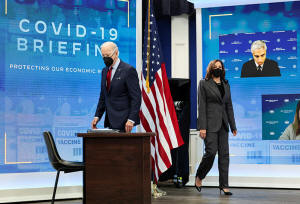|
In a letter dated Aug. 26, Zuckerberg told the judiciary
committee of the U.S. House of Representatives that he regretted
not speaking up about this pressure earlier, as well as some
decisions the owner of Facebook, Instagram and WhatsApp had made
around removing certain content.
"In 2021, senior officials from the Biden Administration,
including the White House, repeatedly pressured our teams for
months to censor certain COVID-19 content, including humor and
satire, and expressed a lot of frustration with our teams when
we didn't agree," Zuckerberg wrote in the letter, which was
posted by the Committee on the Judiciary on its Facebook page.
"I believe the government pressure was wrong, and I regret we
were not more outspoken about it," he wrote. "I also think we
made some choices that, with the benefit of hindsight and new
information, we wouldn't make today."
The White House and Meta did not respond to a request for
comment outside U.S. business hours.
The letter was addressed to Jim Jordan, the chairman of the
committee and a Republican. In its Facebook post, the committee
called the letter a "big win for free speech" and said that
Zuckerberg had admitted that "Facebook censored Americans".
In the letter, Zuckerberg also said he would not make any
contributions to support electoral infrastructure in this year's
presidential election so as to "not play a role one way or
another" in the November vote.
During the last election, which was held in 2020 during the
pandemic, the billionaire contributed $400 million via the Chan
Zuckerberg Initiative, his philanthropy venture with his wife,
to support election infrastructure, a move that drew criticism
and lawsuits from some groups that said the move was partisan.
(Reporting by Gnaneshwar Rajan in Bengaluru; editing by Miral
Fahmy)
[© 2024 Thomson Reuters. All
rights reserved.]
Copyright 2022 Reuters. All rights reserved. This material may
not be published, broadcast, rewritten or redistributed.
Thompson Reuters is solely responsible for this content.

|
|




